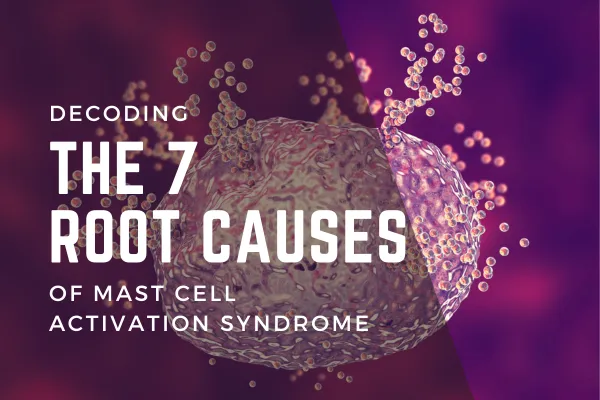
Decoding the 7 Root Causes of Mast Cell Activation Syndrome
Mast Cell Activation Syndrome (MCAS) is a condition that has been gaining more attention in recent years. It can be difficult to diagnose because the symptoms can vary widely from person to person. It wasn't even named until 2007 so many doctors are not familiar with the condition. In this blog, we will explain what MCAS is and its root causes. We will explore how mast cells work, their connection to histamine and stress, and the symptoms of MCAS. We will also discuss how you can support your body if you suspect you have MCAS. We'll break down the 7 root causes of Mast Cell Activation Syndrome, including inherited stressors, immune stressors, and consumption stressors. Lastly, we will touch upon the importance of addressing stress and early trauma while offering a roadmap for holistic healing. If you or someone you know struggles with Mast Cell Activation Syndrome, then this blog is for you!
Explaining Mast Cell Activation Syndrome (MCAS)
MCAS occurs when mast cells become overactive and release an inappropriate amount of chemicals into your body. This excessive reaction leads to a wide array of symptoms, many similar to allergy-like response symptoms, due to the release of histamine. These symptoms stem from the adverse reactions caused by mast cell mediators in various organ systems. Severe MCAS often includes episodes of anaphylaxis, a severe, life-threatening allergic reaction. Diagnosis is often extremely difficult and requires the presence of symptoms from at least two organ systems, and mast cell mediators like histamine, prostaglandins, and tryptase contribute to inflammation and allergic reactions. Extreme procedures like a bone marrow biopsy to try to get a diagnosis. However, as you will read in this article, healing is possible. If you suspect you have MCAS, it is important to note where to invest your limited energy and efforts. Is it important to get an official diagnosis or to put your efforts into healing the root causes? That is for your to decide.
Understanding the Role of Mast Cells
Mast cells are white blood cells, which are an essential part of our immune system that release various mediators like histamine and prostaglandins upon activation, triggering symptoms including hives and low blood pressure. In plain language they are simply white blood cells with a job to put out any internal fires from an immune or stress response. Visualizing mast cells as the body's first responders to infections provides a clear perspective on their crucial role in the immune response. Abnormal mast cell activity could stem from a number of stressors adding too much strain on the body, making understanding your unique body vital for returning to wellness.

Symptoms of MCAS or Mastocytosis
While we have primarily been talking about MCAS, there is another Mast Cell Activation Disorder that is primarily genetic called Microcytosis. Recognizing symptoms of MCAS or Microcytosis involves understanding how they can affect different organ systems, including the skin, gastrointestinal tract, and cardiovascular system. Mastocytosis is a rare disorder characterized by the abnormal accumulation of mast cells in various tissues. MCAS involves the inappropriate release of mast cell mediators, causing symptoms similar to those of allergic reactions, without the notable mast cell accumulation seen in mastocytosis.
Common indicators of MCAS encompass hives, diarrhea, nausea, abdominal pain, headaches, and low blood pressure. Flare-ups in MCAS patients may be triggered by infections, stress, or certain foods, making it crucial to identify specific triggers for reducing and avoiding flares. However, this is easier said than done due to the varying severity of symptoms among individuals, which poses challenges in diagnosis and treatment. The diagnostic criteria for MCAS involve recognizing these diverse symptoms and identifying their triggers, which can differ widely among mast cell patients.

Mast Cells and Histamine - It isn't Allergies
My personal introduction to MCAS came from my awareness of allergy-like responses to some foods that my daughter would eat. I thought it was allergies at first. When her doctor and allergist were no help, I decided to google the trigger foods and came across Histamine Intolerance. When we switched to a low-histamine diet, her symptoms improved but she would still flare while on it, so I knew there was something more. It was our holistic doctor who ended up confirming a few months later that it was indeed MCAS as well and we set to work at healing
When mast cells break down or degranulate, they release histamine and exacerbating symptoms in MCAS patients. Many doctors simply recommend to take antihistamines, which block the histamine receptors in the body, which is the definition of treating the symptoms. Additionally, a Low-Histamine Diet is recommended as a short-term tactic as it is extremely restrictive. Think of it as keeping your digestive system's burden low while healing. The stress response can also activate mast cells and chronic stress could absolutely contribute to the persistence of MCAS symptoms. Understanding the interplay between mast cells, histamine, and stress is vital for managing the condition effectively, optimizing overall health and well-being.
Is there a Mast Cell Activation Syndrome Cure?
Currently, there is no known cure for MCAS if you're looking for one easy pill. While standard of care involves using prescriptions like antihistamines and blockers to manage symptoms, integrative approaches to healing holistically have shown success. That being said, healing is absolutely possible. My own personal experience is a testament to that.
Our understanding of MCAS is still evolving but one key player who has been on the cutting edge due to her personal experience and determination to heal is Beth O'Hara, Functional Naturopath. After healing herself, she created MastCell360 to share her wisdom and guidance with others. She has significantly advanced the understanding of MCAS. Her expertise in addressing the root causes of mast cell activation syndrome has positively impacted numerous patients. Emphasizing personalized and holistic strategies for managing MCAS, Beth O'Hara's approach has provided invaluable insights for both patients and healthcare professionals. My own personal holistic doctor took one of her courses and recommended it to me as well.

Exploring the 7 Root Causes of Mast Cell Activation Syndrome
In a blog post entitled, 7 Root Causes of Mast Cell Activation Syndrome, Beth explores how MCAS may stem from various stressors - environmental, genetic, and immune, among others. While I am deeply grateful she has the courage to do the work she does, as I am following a similar path, it always felt like something was missing. When we primarily focus on the physical like genetics, diets, supplements, etc., it can sometimes give the feeling that our bodies are machines that need to be fixed. The 7 categories she outlined are important but of the mind, body, spirit approach to holistic health, there is little said about the spirit. I'll explore that later in this blog post. That being said, here is a bit of an expansion on what she covers that I believe are extremely important: Consumption, Immune, and Inherited Stressors.
Consumption Stressors: Mediators Avoiding Anaphylaxis
Consumption stressors refers to anything that we put in, on and around our bodies that can add to our Total Stressor Load. This was the very first point listed with "food triggers" on MastCell360's 7 Root Causes of Mast Cell Activation Syndrome. While many want to avoid allergens, equally important is to understand the quality of food consumed and limit pesticides, artificial coloring, preservatives, and synthetic vitamins. They can add to your overall burden which may present as an allergies, adding to the confusion. While the life-threatening allergic reaction, anaphylaxis, is often tied with allergies, MCAS is different than a typical allergic reaction. The total strain the body is carrying and can arise from exposure to environmental triggers, including dietary, topical, and airborne factors. Specific foods, products, and allergens can aggravate MCAS symptoms, requiring identification and avoidance for effective management.
Assessing environmental exposures comprehensively is crucial to minimize mast cell activation and its impact on daily life. Understanding the role of consumption stressors in exacerbating MCAS highlights the need for personalized treatment plans and underscores their significance in the diagnostic criteria for mast cell disease. Addressing these stressors is central to mitigating the diverse mediators involved in MCAS while considering overlaps with conditions such as asthma and anaphylaxis.
Immune Stressors: Hidden Infections
The immune system is a critical part of our survival and takes the most amount of energy to work. Chronic infections, such as Lyme disease, parasites, and viral pathogens, can activate mast cells, contributing to sustained degranulation and persistent symptoms. That is why it's not surprising that infections and toxicity were listed as number two on the 7 Root Causes of Mast Cell Activation Syndrome.
Treating underlying infections is essential for managing mast cell activation syndrome. Parasites is actually one of the most common hidden infections that significantly contribute to MCAS prevalence, which is why I've partnered with Sun Genomics. They empower people to get to the root of their health issues by offering at home gut microbiome testing and custom probiotics. Their tests allow you to see if there is any bacterial, fungal, parasitic or other type of gut imbalance that is significantly contributing to your MCAS symptoms. Simply use code "Stressology" at checkout on any product and save $25.

Inherited Stressors: Epigenetics
Point 3 on the 7 root causes of mast cell activation syndrome focus on genetic factors, which can contribute to point 4 which is nutritional deficiencies. Unraveling the underlying mechanisms of MCAS entails comprehending the influence of genetic predisposition, epigenetic factors, and nutritional deficiencies on mast cell activity. Genetic mutations, particularly in genes related to mast cell function, can predispose individuals to MCAS, emphasizing the need for supporting the body's methylation and detoxification pathways. Personalized treatment for MCAS necessitates a comprehensive assessment of genetic, epigenetic, and nutritional factors, highlighting the crucial role of understanding and addressing inherited stressors in managing this condition effectively.
The PRIMARY Root Cause of MCAS: Stress and/or Early Trauma
The last of the 7 Root Causes of Mast Cell Activation Syndrome Beth listed was Stress and/or Early Trauma. However, I'd like to propose that stress is the key to understanding the condition in its entirety. The Stressology methodology hinges on this inclusive approach, acknowledging stress as a pivotal factor in mast cell and all other diseases.
Stress Redefined - A demand for change
Dr. Hans Selye originally defined stress as any non-specific demand for change by a stressor, although he later expressed regret for his word choice and indicated that he would have used the term 'strain' instead. The human body has a limited capacity to handle change or stressors, and exceeding this bandwidth can lead to detrimental effects. One such consequence is the potential for stress to trigger mast cell degranulation, resulting in the release of histamine and various other mediators. This physiological response offers insight into why simply controlling one's diet may not be sufficient when managing conditions such as Histamine Intolerance or Mast Cell Activation Syndrome.

Energetic Stressors - The Most Overlooked
Being energetic beings, the human body is susceptible to various forms of stressors, including electromagnetic fields and energy pollution. It's observed that these stressors could energetically affect mast cell mediators and exacerbate symptoms in patients with MCAS, Histamine Intolerance, and other chronic issues. Surprisingly, energetic stressors that trigger mast cell activation in some individuals are often overlooked by MCAS experts. Unfortunately, it was left off of the 7 Root Causes of Mast Cell Activation Syndrome, which is why I've included it here and in the Root Cause Roadmap. My hope is that people can become aware of these energy body issues and how they can play a significant role in the holistic treatment and management of MCAS and every type of disease.
The Root Cause Roadmap
Monique Lauria developed the Root Cause Roadmap based on extensive research to aid her daughter with MCAS. Through her vast consumption of resources, including books, podcasts, and courses, she has streamlined the path for others. Taking charge of your healing journey is essential, as is becoming your own private detective. Identifying and addressing root causes is pivotal in reclaiming health and happiness. The Root Cause Roadmap provides an overarching view and additional resources for personal exploration. Reclaiming health and happiness is possible with the right knowledge and guidance.

The key to healing holistically if you suspect MCAS
The body's innate ability to heal itself forms the cornerstone of holistic healing. Understanding and working to address the 7 root causes of mast cell activation syndrome, as well as the others I've included, holds the key to restoring the body to homeostasis. Holistic approaches are designed to target these root causes, alleviating the overall burden on the body. As the mental, physical, emotional, energetic, and spiritual load diminishes, the body naturally regains its balance. Ultimately, the choice lies with the individual: mere survival or thriving. Embracing holistic healing empowers individuals to reclaim their health and well-being by addressing the underlying factors contributing to MCAS.
Supporting your body involves nurturing a harmonious connection between your mind, body, and spirit. Conscious consumption plays a pivotal role in maintaining the overall health of mast cell patients, supporting their journey towards wellness. Engaging in intuition-led movement is essential for effectively managing MCAS, providing a holistic approach to physical well-being. Incorporating mind-body practices, such as meditation, can significantly contribute to the management of MCAS, offering a sense of tranquility and balance. Furthermore, prioritizing the support of the body's methylation and detoxification pathways is fundamental in promoting overall wellness and vitality.

If you need additional support in gathering the needed knowledge and skills to resolve your histamine intolerance of MCAS at the root, then consider joining the Pro Histamine Pivot Program. I created it based on extensive research and personal success in healing both conditions so that others don't have to struggle the way that I did.





